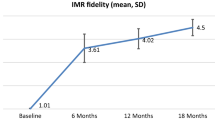Abstract
This study examined three methodological approaches to defining the critical elements of Illness Management and Recovery (IMR), a curriculum-based approach to recovery. Sixty-seven IMR experts rated the criticality of 16 IMR elements on three dimensions: defining, essential, and impactful. Three elements (Recovery Orientation, Goal Setting and Follow-up, and IMR Curriculum) met all criteria for essential and defining and all but the most stringent criteria for impactful. Practitioners should consider competence in these areas as preeminent. The remaining 13 elements met varying criteria for essential and impactful. Findings suggest that criticality is a multifaceted construct, necessitating judgments about model elements across different criticality dimensions.
Similar content being viewed by others
References
Baer, J. S., Ball, S. A., Campbell, B. K., Miele, G. M., Schoener, E. P., & Tracy, K. (2007). Training and fidelity monitoring of behavioral interventions in multi-site addictions research. Drug and Alcohol Dependence, 87(2–3), 107–118. doi:10.1016/j.drugalcdep.2006.08.028.
Bellack, A. S. (2004). Skills training for people with severe mental illness. Psychiatric Rehabilitation Journal, 27(4), 375.
Bickman, L. (1987). The functions of program theory. In L. Bickman (Ed.), Using Program Theory in Evaluation (pp. 5–18). San Francisco: Jossey-Bass.
Bond, G. R. (1991). Variations in an assertive outreach model. New Directions for Mental Health Services, 52, 65–80. doi:10.1002/yd.23319915207.
Bond, G. R. (2004). Supported employment: evidence for an evidence-based practice. Psychiatric Rehabilitation Journal, 27(4), 345–359.
Bond, G. R., Evans, L., Salyers, M. P., Williams, J., & Kim, H. W. (2000a). Measurement of fidelity in psychiatric rehabilitation. Mental Health Services Research, 2(2), 75–87.
Bond, G. R., & Salyers, M. P. (2004). Prediction of outcome from the Darthmouth assesrtive community treatment fidelty scale. CNS Spectrums, 9(12), 932–942.
Bond, G. R., Williams, J., Evans, L., Salyers, M., Kim, H. W., Sharpe, H., & Leff, H. S. (2000b). Psychiatric rehabilitation fidelity toolkit. Cambridge: Human Services Research Institute.
Carroll, C., Patterson, M., Wood, S., Booth, A., Rick, J., & Balain, S. (2007). A conceptual framework for implementation fidelity. Implementation Science, 2(40), 1–9. doi:10.1186/1748-5908-2-40.
Cook, T. D., Campbell, D. T., & Day, A. (1979). Quasi-experimentation: Design & analysis issues for field settings. Boston: Houghton Mifflin.
Damschroder, L. J., Aron, D. C., Keith, R. E., Kirsch, S. R., Alexander, J. A., & Lowery, J. C. (2009). Fostering implementation of health services research findings into practice: A consolidated framework for advancing implementation science. Implementation Science, 4, 50. doi:10.1186/1748-5908-4-50.
Davidson, P. R., & Parker, K. C. (2001). Eye movement desensitization and reprocessing (EMDR): A meta-analysis. Journal of Consulting and Clinical Psychology, 69(2), 305.
Dixon, L., McFarlane, W. R., Lefley, H., Lucksted, A., Cohen, M., Falloon, I., & Sondheimer, D. (2001). Evidence-based practices for services to families of people with psychiatric disabilities. Psychiatric Services, 52(7), 903–910.
Drake, R. E., Goldman, H. H., Leff, H. S., Lehman, A. F., Dixon, L., Mueser, K. T., & Torrey, W. C. (2001). Implementing evidence-based practices in routine mental health service settings. Psychiatric Services, 52(2), 179–182.
Durlak, J. A., & DuPre, E. P. (2008). Implementation matters: A review of research on the influence of implementation on program outcomes and the factors affecting implementation. American Journal of Community Psychology, 41(3–4), 327–350. doi:10.1007/s10464-008-9165-0.
Dusenbury, L., Brannigan, R., Falco, M., & Hansen, W. B. (2003). A review of research on fidelity of implementation: implications for drug abuse prevention in school settings. Health Education Research, 18(2), 237–256. doi:10.1093/her/18.2.237.
Färdig, R., Lewander, T., Melin, L., Folke, F., Fredriksson, A. (2011). A randomized controlled trial of the illness management and recovery program for persons with schizophrenia. Psychiatric Services (Washington, D.C.), 62(6), 606–612. doi:10.1176/appi.ps.62.6.606.
Haddock, G., Devane, S., Bradshaw, T., McGovern, J., Tarrier, N., Kinderman, P., & Harris, N. (2001). An investigation into the psychometric properties of the cognitive therapy scale for psychosis (CTS-Psy). Behavioural and Cognitive Psychotherapy, 29, 221–233.
Hasson-Ohayon, I., Roe, D., & Kravetz, S. (2007). A randomized controlled trial of the effectiveness of the illness management and recovery program. Psychiatric Services, 58(11), 1461–1466. doi:10.1176/appi.ps.58.11.1461.
Keith, R. E., Hopp, F. P., Subramanian, U., Wiitala, W., & Lowery, J. C. (2010). Fidelity of implementation: development and testing of a measure. Implementation Science, 5(1), 99. doi:10.1186/1748-5908-5-99.
Kitson, A., Harvey, G., & McCormack, B. (1998). Enabling the implementation of evidence based practice: a conceptual framework. Quality in Health Care, 7(3), 149–158.
Koop, J. I., Rollins, A. L., Bond, G. R., Salyers, M. P., Dincin, J., Kinley, T., & Marcelle, K. (2004). Development of the DPA fidelity scale: Using fidelity to define an existing vocational model. Psychiatric Rehabilitation Journal, 28(1), 16–24.
Kurtz, M. M., Rose, J., & Wexler, B. E. (2011). Predictors of participation in community outpatient psychosocial rehabilitation in schizophrenia. Community Mental Health Journal, 47(6), 622–627. doi:10.1007/s10597-010-9343-z.
Lambert, M. J., & Barley, D. E. (2001). Research summary on the therapeutic relationship and psychotherapy outcome. Psychotherapy: Theory, Research, Practice Training, 38(4), 357. doi:10.1037/0033-3204.38.4.357.
Levitt, A. J., Mueser, K. T., DeGenova, J., Lorenzo, J., Bradford-Watt, D., Barbosa, A., & Chernick, M. (2009). Randomized controlled trial of illness management and recovery in multiple-unit supportive housing. Psychiatric Services, 60(12), 1629–1636. doi:10.1176/appi.ps.60.12.1629.
Locke, E. A., & Latham, G. P. (2002). Building a practically useful theory of goal setting and task motivation: A 35-year odyssey. American Psychologist, 57(9), 705–717.
Marty, D., Rapp, C. A., & Carlson, L. (2001). The experts speak: the critical ingredients of strengths model case management. Psychiatric Rehabilitation Journal, 24(3), 214. doi:10.1037/h0095090.
McEvoy, J. P., Scheifler, P. L., & Frances, A. (1999). The expert consensus guideline series: Treatment of schizophrenia 1999. Journal of Clinical Psychiatry, 60(Supplement 11), 1–80.
McGrew, J. H., & Bond, G. R. (1995). Critical ingredients of assertive community treatment: Judgments of the experts. Journal of Mental Health Administration, 22, 113–125. doi:10.1007/BF02518752.
McGrew, J. H., Bond, G. R., Dietzen, L. L., & Salyers, M. P. (1994). Measuring the fidelity of implementation of a mental health program model. Journal of Consulting and Clinical Psychology, 62(4), 670–678.
McGrew, J. H., & Griss, M. E. (2005). Concurrent and predictive validity of two scales to assess the fidelity of implementation of supported employment. Psychiatric Rehabilitation Journal, 29(1), 41–47. doi:10.2975/29.2005.41.47.
McGuire, A. B., & Bond, G. B. (2011). Critical elements of the crisis intervention team model of jail diversion: An expert survey. Behavioral Science and the Law, 29, 81–94. doi:10.1002/bsl.941.
McGuire, A. B., Kukla, M., Green, A., Gilbride, D., Mueser, K. T., & Salyers, M. P. (2014). Illness management and recovery: A review of the literature. Psychiatric Services, 65(2), 171–179. doi:10.1176/appi.ps.201200274.
McGuire, A. B., Stull, L. G., Mueser, K. T., Santos, M., Mook, A., Rose, N., & Salyers, M. P. (2012). Development and reliability of a measure of clinician competence in providing illness management and recovery. Psychiatric Services, 63(8), 772–778. doi:10.1176/appi.ps.201100144.
Michalak, J., & Holtforth, M. G. (2006). Where do we go from here? the goal perspective in psychotherapy. Clinical Psychology: Science and Practice, 13(4), 346–365. doi:10.1111/j.1468-2850.2006.00048.x.
Mihalic, S. (2004). The importance of implementation fidelity. Report on Emotional and Behavioral Disorders in Youth, 4(83–86), 99–105.
Mowbray, C. T., Holder, M., Teague, G. B., & Bybee, D. (2003). Fidelity criteria: Development, measurement, and validation. American Journal of Evaluation, 24, 315–340. doi:10.1177/109821400302400303.
Mueser, K. T., Corrigan, P. W., Hilton, D. W., Tanzman, B., Schaub, A., Gingerich, S., & Herz, M. I. (2002a). Illness management and recovery: A review of the research. Psychiatric Services, 53, 1272–1284.
Mueser, K. T., Gingerich, S. (2002). Illness Management and Recovery Implementation Resource Kit. Rockville, MD: Center for Mental Health Services, Substance Abuse and Mental Health Services Administration.
Mueser, K. T., Gingerich, S., Bond, G. R., Campbell, K., & Williams, J. (2002b). Illness management and recovery fidelity scale. In K. T. Mueser & S. Gingerich (Eds.), Illness management and recovery implementation resource kit. Rockville: Center for Mental Health Services, Substance Abuse and Mental Health Services Administration.
Mueser, K. T., Meyer, P. S., Penn, D. L., Clancy, R., Clancy, D. M., & Salyers, M. P. (2006). The illness management and recovery program: Rationale, development, and preliminary findings. Schizophrenia Bulletin, 32(1), 32–43. doi:10.1093/schbul/sbl022.
Perepletchikova, F., Treat, T. A., & Kazdin, A. E. (2007). Treatment integrity in psychotherapy research: analysis of the studies and examination of the associated factors. Journal of Consulting and Clinical Psychology, 75(6), 829–841. doi:10.1037/0022-006X.75.6.829.
SAMHSA (2012). SAMHSA’s working definition of recovery: 10 guiding principles of recovery. (DHHS Publication No. PEP12-RECDEF). Rockville, MD: Substance Abuse and Mental Health Services Administration.
Schaedle, R., & Epstein, I. (2000). Specifying intensive case management: A multiple stakeholder approach. Mental Health Services Research, 2, 95–105.
Sechrest, L., West, S. G., Phillips, M. A., Redner, R., & Yeaton, W. (1979). Some neglected problems in evaluation research: Strength and integrity of treatments. Evaluation studies review annual, 4, 15–35.
Shapiro, F., & Solomon, R. M. (1995). Eye movement desensitization and reprocessing. Wiley Online Library.
Velligan, D. I., Diamond, P. M., Mintz, J., Maples, N., Li, X., Zeber, J., & Miller, A. L. (2008). The use of individually tailored environmental supports to improve medication adherence and outcomes in schizophrenia. Schizophrenia Bulletin, 34(3), 483–493. doi:10.1093/schbul/sbm111.
Webb, C. A., DeRubeis, R. J., & Barber, J. P. (2010). Therapist adherence/competence and treatment outcome: A meta-analytic review. Journal of Consulting and Clinical Psychology, 78(2), 200–211. doi:10.1037/a0018912.
Wright-Berryman, J., McGuire, A. B., & Salyers, M. P. (2011). A review of consumer-provided services on Assertive Community Treatment and intensive case management teatms: Implications for future research and practice. Journal of the American Psychiatric Nurses Association, 17(1), 37–44. doi:10.1177/1078390310393283.
Acknowledgments
This work was supported in part by a grant from the VA HSR&D: RRP 11-017 and the National Institute of Mental Health (R21 MH096835). Dr. McGuire is supported by a Grant from VA RR&D: D0712-W and by the Department of Veterans Affairs, Veterans Health Administration, Health Services Research and Development Service (CIN 13-416). The views expressed in this article are those of the authors and do not necessarily represent the views of the Department of Veterans Affairs or NIMH.
Author information
Authors and Affiliations
Corresponding author
Rights and permissions
About this article
Cite this article
McGuire, A.B., Luther, L., White, D. et al. The “Critical” Elements of Illness Management and Recovery: Comparing Methodological Approaches. Adm Policy Ment Health 43, 1–10 (2016). https://doi.org/10.1007/s10488-014-0614-9
Published:
Issue Date:
DOI: https://doi.org/10.1007/s10488-014-0614-9




